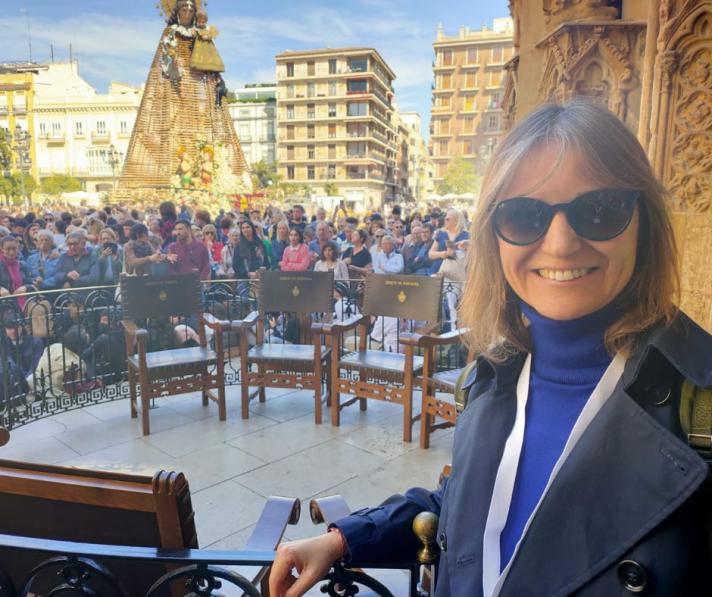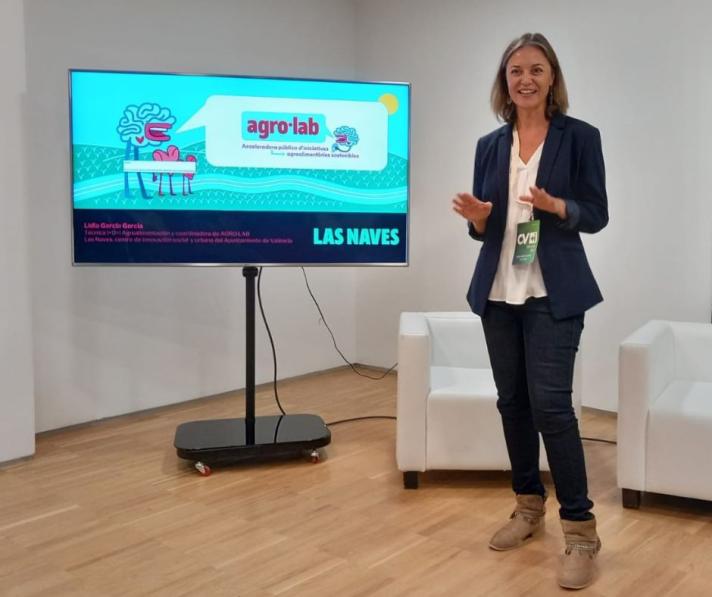Meet Lidia Garcia, a dedicated advocate for sustainable food systems and a key project coordinator at Las Naves Urban Innovation Centre in Valencia. Lidia has extensive experience in international cooperation, public policy and food governance, and has worked tirelessly to position Valencia as a model for sustainable food practices. Her passion for transforming food systems into resilient and inclusive models is evident through her leadership of innovative pilot projects and community-based initiatives. In this interview, Lidia shares insights from her journey, the challenges she faces and how citizen involvement drives meaningful change.
Can you tell us about your professional journey and what led you to your current role?
I’m Lidia Garcia and my career has centred around food policies and sustainability initiatives. I have a master’s degree in public policy and I’ve worked on international cooperation projects in countries like Peru and Morocco, as well as within private companies focused on sustainability. I have always been driven by a desire to create fairer and more resilient food systems. Joining Las Naves in Valencia allowed me to channel this passion by leading impactful projects that align global policy goals with local needs.
What are some key projects you’re working on at Las Naves?
At Las Naves, we focus on developing pilot projects that can be scaled up citywide and enhance residents' quality of life. One example is our work on modernising the traditional irrigation system of the Huerta de Valencia. This system, which relies on centuries-old gravity-based irrigation, is being upgraded with fibre optics and sensors to monitor water flow and temperature in real-time, optimising its use and preserving this invaluable cultural and environmental asset.
Another key challenge is addressing the needs of an ageing farmer population in the region, many of whom are over 75 years old. We aim to offer innovative solutions that respect tradition while ensuring continuity for future generations.
Why is citizen participation so important in your work?
Citizen involvement is crucial to building a sustainable food system. To support this, we established the Municipal Food Council of Valencia, bringing together stakeholders from across the food system, including citizens, businesses, universities and social organisations. The goal is to foster dialogue, encourage practices like the public procurement of local and organic products, and improve school meals with sustainability and nutritional standards. Collaboration is key. By engaging the community, we aim to create a more resilient and inclusive food system.
What challenges do you face in driving these initiatives?
One major challenge is ensuring that sustainability policies are effectively implemented. It’s not enough to simply have good intentions; we need real resources, technical support and collaboration across multiple sectors. Our work at Las Naves touches on areas ranging from agriculture and water management to education and public health, hence coordination is essential. We strive to bring together public and private entities, universities, and community groups to create long-lasting impact.
Lidia Garcia’s work at Las Naves illustrates how innovative approaches and collaborative efforts can transform food systems and promote sustainability. Through pilot projects, community engagement, and advocacy, she is helping to build a more resilient and equitable future for Valencia. Her dedication highlights the power of collective action in creating a greener, healthier city for all.
Citizen Diaries - Valencia - EU Green Capital

Carmen Marqués Ruiz is a dedicated Climate Pact Ambassador from Valencia, Spain, whose commitment to environmental issues has shaped her career and continues to drive her efforts in promoting sustainability.

Meet Mathieu Lassalle, a passionate biologist and ecologist who has significantly advanced nature conservation in Valencia, Spain.
Alejandro Alonso González is a technician in energy projects at València Clima i Energia, a foundation set up by the city to support the city’s transition towards a more sustainable and energy-efficient urban environment.

Juan Luis Pozo Calderón is the chief sustainability officer at Global Omnium, one of Spain's leading water management companies.

Meet Lidia Garcia, a dedicated advocate for sustainable food systems and a key project coordinator at Las Naves Urban Innovation centre in Valencia.

Carlos Sánchez Cerveró serves as the chief sustainability officer at Fundació València Clima i Energia, an organisation dedicated to public energy management and combating climate change.


